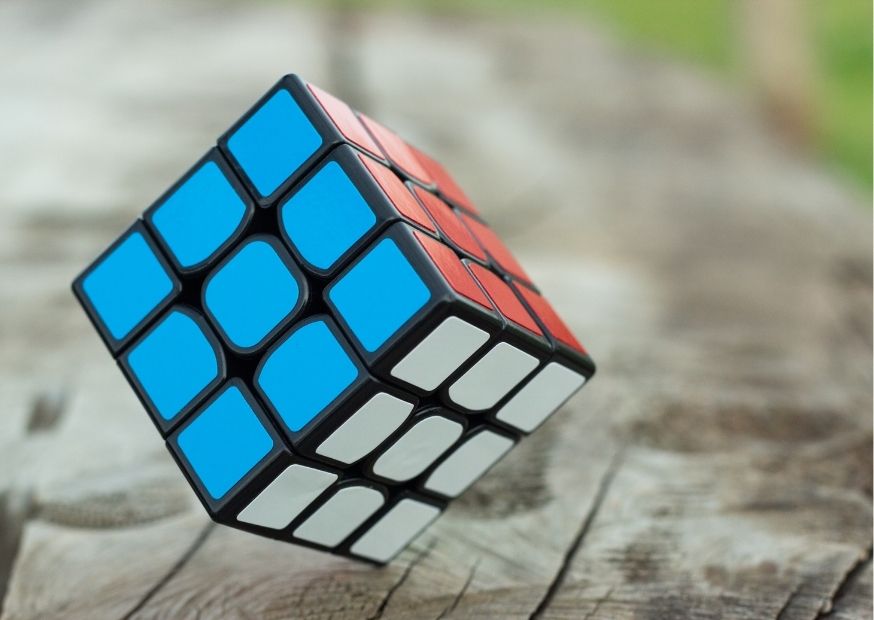
With stress and anxiety reaching almost epidemic levels across our society, more people than ever are searching for ways to relax, relieve tension, and regain a sense of control in their lives.
Naturally, this leads people down paths such as meditation, exercise, and healthy eating. While all of these methods have proven effective, one often overlooked technique to reduce stress is playing games.
As it turns out, there are various brain-boosting games out there that can help you reduce stress while also promoting enhanced cognitive function. That’s because some games can help you be more present in day-to-day tasks by increasing focus, concentration, and problem-solving skills, all of which can help you stop obsessing about the past or worrying about future events. And the bonus? They’re fun! Let’s get into the games.
Rubik’s cube
First invented in 1974, the Rubik’s cube became a global sensation when it was first released into the world. As you are likely aware, the aim of the game is to start with a randomized, jumbled, and disorganized cube configuration and, by rotating the faces, return to the original solution pattern with each side being a single color.

Due to its complexity, Rubik’s cubes offer a wide number of benefits, including improved memory, patience, problem-solving skills, and mental agility. Interestingly, when Erno Rubik first invented it, he wasn’t sure it could ever be solved. After developing the prototype, it took him one whole month to finally find a solution.
Jigsaw puzzles
Jigsaw puzzles are a fantastic game to help boost short-term memory. The more pieces the puzzle contains, the harder your brain has to work. This is because your brain has to observe, analyze, and sort through hundreds (sometimes thousands) of small pieces until you can find a match.

On top of this, jigsaws are great because they stimulate both the left and right sides of your brain. Since to complete a puzzle, you will need to utilize your brain’s logic, intuition, and creative functions.
Sudoku
Did you know that between 10 and 15% of the American population suffers from dementia? If that’s a statistic that concerns you, then you may want to consider trying out Sudoku.

According to a recent study published in the International Journal of Geriatric Psychiatry, playing Sudoku can help to improve brain function and keep dementia at bay. In fact, those who do puzzles such as jigsaws and Sudoku have brain functions equivalent to people that are ten years younger than them.
Chess
Chess is a game that is played and adored all over the world. Due to its seemingly infinite complexity and room for strategy, people from all walks of life devote hours of their time to learning chess and challenging their minds.

As a result, there are many benefits to playing this centuries-old game, such as decreased stress and anxiety, improved memory, and deepened focus. Interestingly, a 2019 study found chess to be another effective means of protecting the elderly from dementia.
Solitaire
Next on our list, we have Solitaire, which is one of the oldest and most widely played card games in history. After first being introduced towards the end of the 18th century, there are now hundreds of different game variations, each of which has its own set of rules and win conditions.

The general concept of most versions of Solitaire is to arrange the cards in a certain sequence (typically from ace through the king in each suit) while being limited to a few permitted moves. Thus, in order to win, the game requires patience, critical thinking, memory, and the ability to recognize patterns, which is why Solitaire is often regarded as one of the best games to boost cognitive performance.
Crosswords
Crosswords are another classic game that can help you wind down, relax, and give your brain a workout. These games can help improve your vocabulary as you try to draw out the missing word from clues while also increasing your knowledge base on important topics (especially popular culture references). In addition to this, you can also use crosswords to strengthen social bonds.

Since crossword puzzles require a wide range of knowledge, people of many ages and backgrounds can assist with them. So, the next time you’re stumped for an answer, don’t be hesitant to approach the person next to you for a helping hand.
Scrabble
Scrabble is another game that will help improve your vocabulary skills, as you must try to make a word out of the tiles you have at your disposal. With an entire dictionary of words to choose from, you can be sure that every round will be different every time you play Scrabble.

This keeps the game fun and engaging and can also prove to be a great way to compete and interact with your friends and family. Amazingly, Scrabble has been known to offer a wide range of mental and physical health benefits, such as reduced blood pressure, improved immune system, and improved memory.
Final word
These eight games all provide an effective means to reduce stress in your life while boosting cognitive function. While most of these games can be tricky, the point is to focus solely on the task at hand, so you can use them as a tool to learn something new and stimulate your brain.
